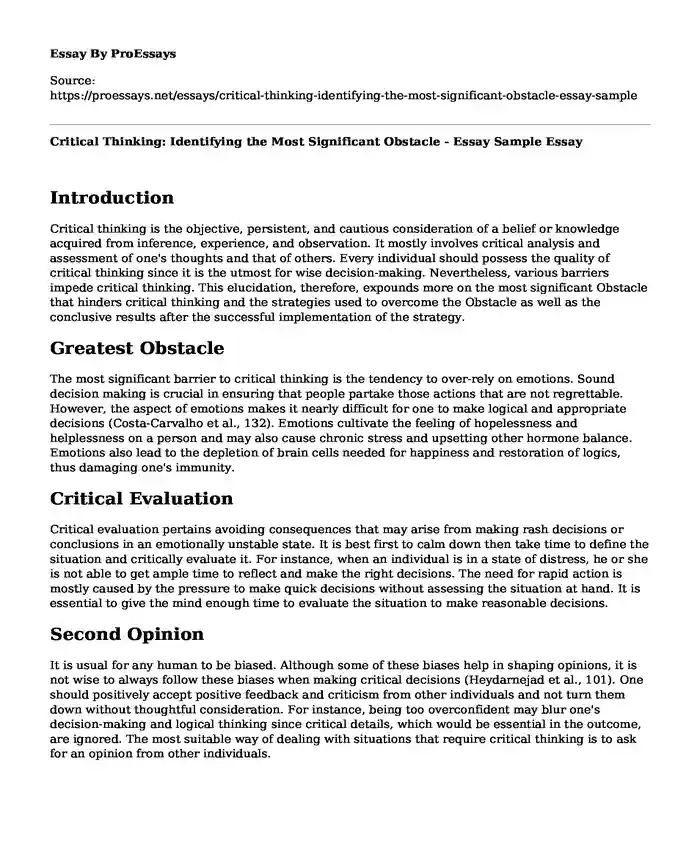Introduction
Critical thinking is the objective, persistent, and cautious consideration of a belief or knowledge acquired from inference, experience, and observation. It mostly involves critical analysis and assessment of one's thoughts and that of others. Every individual should possess the quality of critical thinking since it is the utmost for wise decision-making. Nevertheless, various barriers impede critical thinking. This elucidation, therefore, expounds more on the most significant Obstacle that hinders critical thinking and the strategies used to overcome the Obstacle as well as the conclusive results after the successful implementation of the strategy.
Greatest Obstacle
The most significant barrier to critical thinking is the tendency to over-rely on emotions. Sound decision making is crucial in ensuring that people partake those actions that are not regrettable. However, the aspect of emotions makes it nearly difficult for one to make logical and appropriate decisions (Costa-Carvalho et al., 132). Emotions cultivate the feeling of hopelessness and helplessness on a person and may also cause chronic stress and upsetting other hormone balance. Emotions also lead to the depletion of brain cells needed for happiness and restoration of logics, thus damaging one's immunity.
Critical Evaluation
Critical evaluation pertains avoiding consequences that may arise from making rash decisions or conclusions in an emotionally unstable state. It is best first to calm down then take time to define the situation and critically evaluate it. For instance, when an individual is in a state of distress, he or she is not able to get ample time to reflect and make the right decisions. The need for rapid action is mostly caused by the pressure to make quick decisions without assessing the situation at hand. It is essential to give the mind enough time to evaluate the situation to make reasonable decisions.
Second Opinion
It is usual for any human to be biased. Although some of these biases help in shaping opinions, it is not wise to always follow these biases when making critical decisions (Heydarnejad et al., 101). One should positively accept positive feedback and criticism from other individuals and not turn them down without thoughtful consideration. For instance, being too overconfident may blur one's decision-making and logical thinking since critical details, which would be essential in the outcome, are ignored. The most suitable way of dealing with situations that require critical thinking is to ask for an opinion from other individuals.
Evaluation
Emotions are based on how an individual feel. Though it is essential for one to feel emotions, it is more critical for individuals to avoid making judgments clouded by emotions (Costa-Carvalho et al., 133). Important decisions should be made effectively by practising reasonable synthesis, which refers to the evaluation of hard facts or evidence for logical thinking and decision-making. Rational synthesis can only be a success when one is out of an elevated emotionalized state.
Results
Based on the emotion-regulation strategies, critical evaluation of facts and evidence has been helpful since concrete decisions are made based on rational analysis. Assessment of facts can only be achieved when one is at a stable emotional state. There has been a significant improvement in the level of emotional dependency on decision-making. The ability to embrace the culture of seeking a second opinion has brought positive results during decision-making. People tend to have different ways of thinking which help in making logical conclusions when certain situations arise. As a critical thinker, emotional awareness has been successfully established in creating more room for proper decision-making skills and less reliance on emotions during logical thinking.
The strategies incorporated in this paper have exhibited the importance of defining problems, avoiding emotional reasoning, and evidence evaluation when making critical decisions. One of the challenges faced while implementing the strategies is that quick decisions had to be made mostly when in an emotionally unstable state. There have been cases of decisions made based on the emotions of fear or anger. Emotions such as anger trigger the need for rapid action, which leads to less contemplation of what choices are available to an individual. It is challenging to contain emotions whenever a complex and highly distressful situation arises.
Conclusion
In summary, emotions have a significant influence on critical thinking. Obstacles such as reliance on emotions can harm rational and informed critical thinking. The ability to comprehend emotions and be able to include them in the process of critical thinking is worthy to one's capability of making proper decisions. Various strategies are sufficient to overcome the reliance on emotions in critical thinking. Such strategies include the essential evaluation of a situation, seeking a second opinion, and considering the assessment of facts before any decision. Everyone should eliminate any obstacle that might hinder proper decision-making.
Works Cited
Costa-Carvalho, Magda, and Dina, Mendonca. "Reasonableness and Emotions." The Routledge International Handbook of Philosophy for Children. 2016. 127.
http://repositorio.uac.pt/bitstream/10400.3/4010/3/MCCarvalho_PublicacaoRoutledge_pp127-134.pdf
Heydarnejad, Tahereh, Ebrahimi, Reza, Mohammad, and Najjari, Hossein. "On the Associations among Critical Thinking, Reflective Thinking, and Emotions: A Case of Iranian EFL Teachers." International Journal of Applied Linguistics and English Literature 7.6. 2018. 97-103.
http://www.journals.aiac.org.au/index.php/IJALEL/article/download/4831/3658.
Cite this page
Critical Thinking: Identifying the Most Significant Obstacle - Essay Sample. (2023, Nov 17). Retrieved from https://proessays.net/essays/critical-thinking-identifying-the-most-significant-obstacle-essay-sample
If you are the original author of this essay and no longer wish to have it published on the ProEssays website, please click below to request its removal:
- Lesson Title: Special English Learning for Normal and Autism Diagnosed Children at the Pre-school Stage
- Essay Sample on Treating Neurocognitive Disorder: Delirium & Its Symptoms
- Essay Sample on School-Based Programs: Reducing Tooth Decay in Kids
- Paper Example on Duke College Guilty of Fraudulent Research for Grants
- Essay Sample on Babies' Attachment Patterns
- Essay Example on Disability
- Essay Sample: Employee Well-Being and Knowledge Sharing in Saudi Aramco







